Article's Content
Generative AI represents both the biggest threat and biggest opportunity to this segment of the workforce.
Since ChatGPT first came on the scene in late 2022, marketers and content creators have been one of the roles most interested in its use. It’s not surprising that this is the case.
Experts project that generative AI will add nearly $500 billion in value to the global marketing industry through productivity lifts. That’s a massive overall impact.
But what about at the organizational and individual levels? How are marketers using generative AI in their day-to-day lives? And how do they feel about this impact?
We fired up and sent out a poll to better understand how marketers and management feel about using tools like ChatGPT, DALL-E, and Jasper (among countless others) in the workplace.
Over 360 marketers weighed in, with strong representation from leaders, managers, specialists, and SEO experts. Of these marketers, 247 work for brands with 50 employees or fewer, but there was good representation from marketers at companies with over 100 employees (84).
To get the lay of the AI marketing landscape, we asked participants questions from the following categories:
- Current Usage of AI in the Workplace
- Biggest Concerns About AI
- The Impact of Artificial Intelligence on the Industry and Beyond
- How Leaders Are Looking to Implement AI in the Organization
- Level Up Your Skill Set in 2024 with the AI Marketing Console
The data from these questions provides insights into the state of AI in marketing after the technology’s first full year in the tech limelight.
In this comprehensive article, we’re going to dive into how artificial intelligence is impacting the marketing industry, from the thoughts, concerns, and usage of individuals to company-wide planning.
Let’s get started.
Current Usage of AI in the Workplace
One of the main benefits of working in SaaS marketing at Foundation is that we learn about and experiment with technologies before many others are able to use them. Well, that advantage is crucially important given the long-ranging impacts of artificial intelligence.
Building up skills like prompt engineering or developing new AI content workflows can translate into massive gains over competitors.
Naturally, the first question on everyone’s mind is: Are people actually using artificial intelligence as much as they say they are?
Yes, Marketers Use Artificial Intelligence in the Workplace
Sure, there’s lots of hype going around on LinkedIn, X, and subreddits about using ChatGPT or Jasper to gain an edge, but just how many people are actually building up that knowledge and applying it day in and day out?
As you probably suspect, the vast majority of our respondents do use it—nearly 85%, in fact.

Over 300 of the marketing pros we surveyed use artificial intelligence daily to improve their performance. If we extend that to the industry in general, it looks like everyone is looking to level up their AI skills. The race is on.
Content Creation Is Far and Away the Most Common AI Use Case for Marketers
In terms of how marketers are using AI in the workplace, the most common usage is content creation—cited by 87% of our respondents. Given that the most popular AI tool, ChatGPT, is a text-based generative tool, this isn’t surprising either.
From leading SaaS brands and agencies to major publications like Wired, companies are using AI to help streamline the content creation process. The final product is typically polished up by a number of real people, but the fingerprints of AI are still all over the content we see across the web and social media.
We’ve established that content creation is the most popular usage of AI. Now, let’s look at some more specific use cases.
The next most popular applications of artificial intelligence among our marketing respondents are keyword research (42%), social media (39%), email marketing (39%), and note-taking (36%).
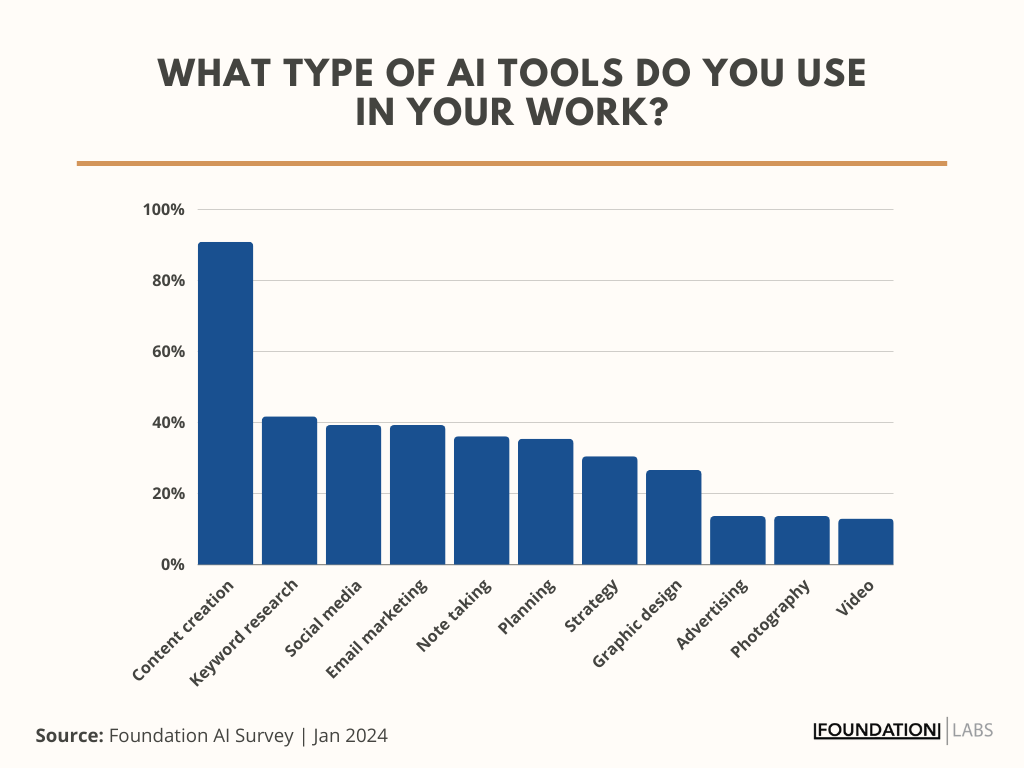
Generative AI is proving to be a good resource for preliminary keyword research, allowing marketers to quickly generate a list of short-, mid-, and long-tail keywords to include in their content. Some of the most popular ChatGPT plugins are SEO-focused and can help with analyzing content and extracting the most important terms.
One of the most underrated applications of AI at the moment is taking meeting recording and note-taking to the next level. For example, tools like Avoma can transcribe call recordings and create a searchable archive of meeting notes.

Instead of skipping through hours of video recordings to find key information, AI helps turn your archive into a searchable library complete with summaries and revenue intelligence.
ChatGPT, Canva, and Grammarly Lead the Way in Terms of Common Tools
As expected, ChatGPT is the AI tool of choice among marketers—99.65% of our respondents are familiar with it. The tool has dominated headlines for the past year to the point that it’s almost synonymous with artificial intelligence itself.
It’s also one of the best horses to back in the race. ChatGPT is affordable, powerful, and constantly being improved by industry-leading researchers. This year alone, OpenAI has improved its utility with features like APIs, plugins, and now customizable, task-based GPTs. It’s essentially a one-stop shop for marketers at this point.
But, it’s also something of a generalist.
If you want to zero in on a specific domain, like image creation or copy editing, then a targeted application of AI is a better choice. Canva, Grammarly, Midjourney, and DALL-E are some of the other AI (or AI-enhanced) tools that marketers are familiar with.
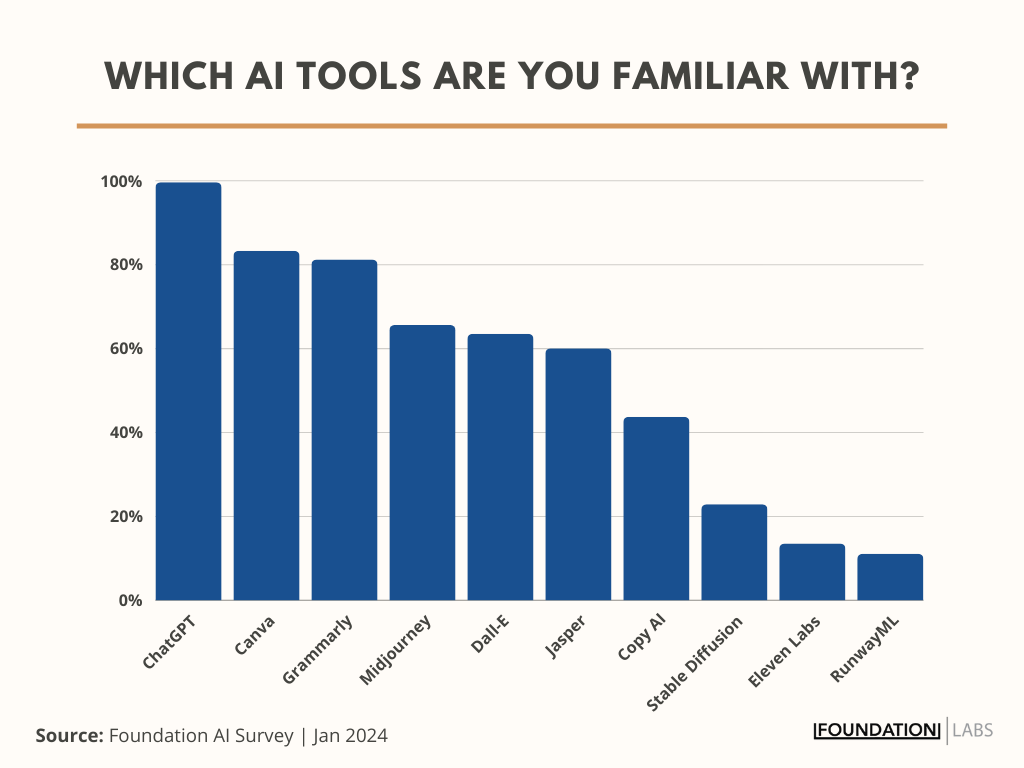
It’s interesting to note that AI detection tools haven’t gained traction in the marketing space—at least not yet. Just under 30% (89) of our respondents said they use AI detection tools at work.
Most of us are familiar with the AI-isms, so it’s just a matter of refining outputs so they read more humanly. The use of AI for marketing is essentially undeniable at this point; now, it’s about establishing workflows that produce content that reads like a human wrote it.

While AI is abundantly popular among marketers, the usage of AI detection tools is lagging behind.
AI-Written Content Still Isn’t Up to the Standard of Human-Written Content
When OpenAI released ChatGPT and GPT4, the company included long, detailed studies explaining how these models were capable of creating content at a university level and beyond.
Well, it looks like it left marketers out of that report.
We asked our respondents how they compare AI-written content to human-written content—the majority aren’t too impressed with the former. Only about 11% of our respondents believe AI-written content is better than human-written content. That’s in contrast to the nearly 63% who believe it is worse.
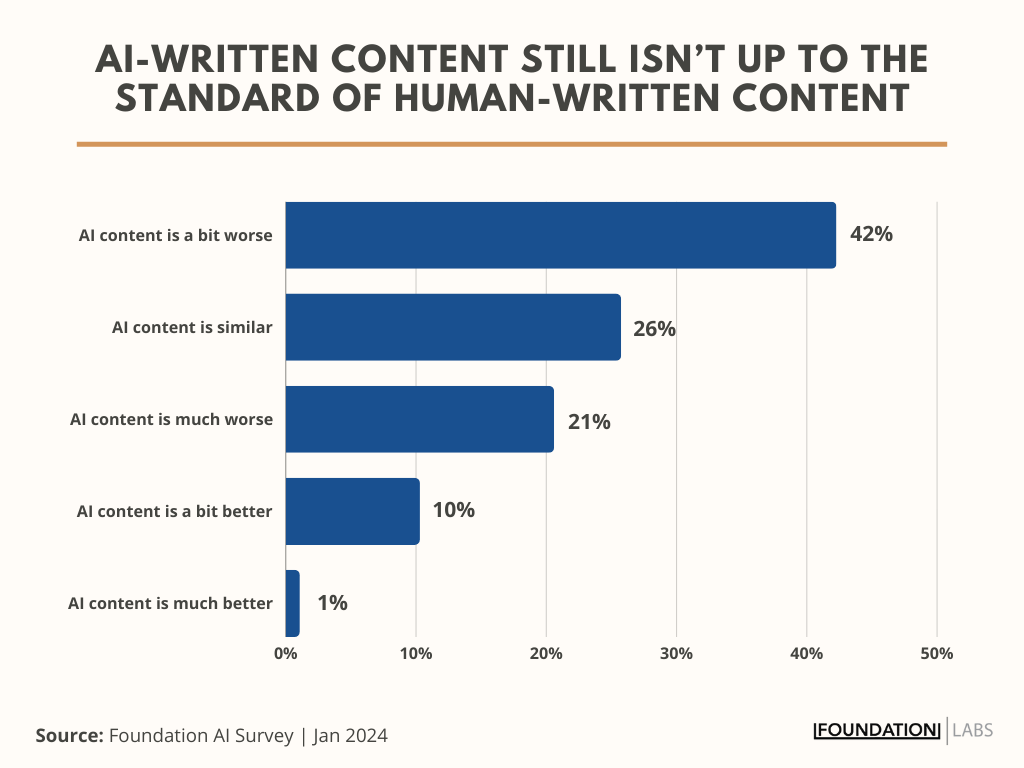
Interestingly, about a quarter of respondents believe that the content of ChatGPT, Jasper, and other generative tools is similar to the content marketers create. It could be a matter of not using AI the right way, and it will be interesting to see how this opinion evolves alongside the technology itself.
The Majority of Marketers Believe AI Is Important to Doing Their Job
Despite the many perceived shortcomings of AI (like content creation), nearly 75% of respondents believe that artificial intelligence is at least moderately important to doing their job well. Over 150 believe that it’s very or extremely important.
That number will certainly increase as knowledge of how marketers can use artificial intelligence to improve results spreads throughout the industry.

For instance, as more and more SaaS companies integrate AI into their product suites through APIs, prompt engineering and precise language manipulations will become a coveted skill.
Biggest Concerns About AI
It’s still very early days in the commercialization of artificial intelligence. That means it’s just as important to understand human concerns about AI’s trajectory as it is to understand how they currently use it.
With that in mind, we asked respondents some questions about the biggest concerns they have about the impact AI will have in the marketing industry and beyond. One of the immediate concerns that began circulating after the release of ChatGPT and other LLM-based generative AIs is the impact that they will have on certain job segments.
In the same way automation has replaced jobs across everything from manufacturing to front-line retail, experts have projected that the same will inevitably happen for jobs in the information sectors.
So far, marketers feel good about their chances.
Over 55% of our respondents are very or extremely confident that AI won’t replace them. Another 24% are moderately confident that they won’t be replaced. Just over 20% of marketers have low confidence in their ability to hold back the inevitable tide of job replacement.

Interestingly, this high level of confidence doesn’t extend to marketing in general.
Marketers Believe Writers, Email Marketers, and Graphic Designers Are Most at Risk
We asked our respondents which marketing roles are most at risk due to the rise in artificial intelligence—covering everything from writing and SEO strategies to media buying and web development. Unsurprisingly, marketers have lower confidence in the marketing domains most closely impacted by generative AI.
Nearly 75% of our respondents—over 250 marketers—believe that the role of content writer is at risk due to AI (*Gulp*). And 44% believe the same is true of email marketing.
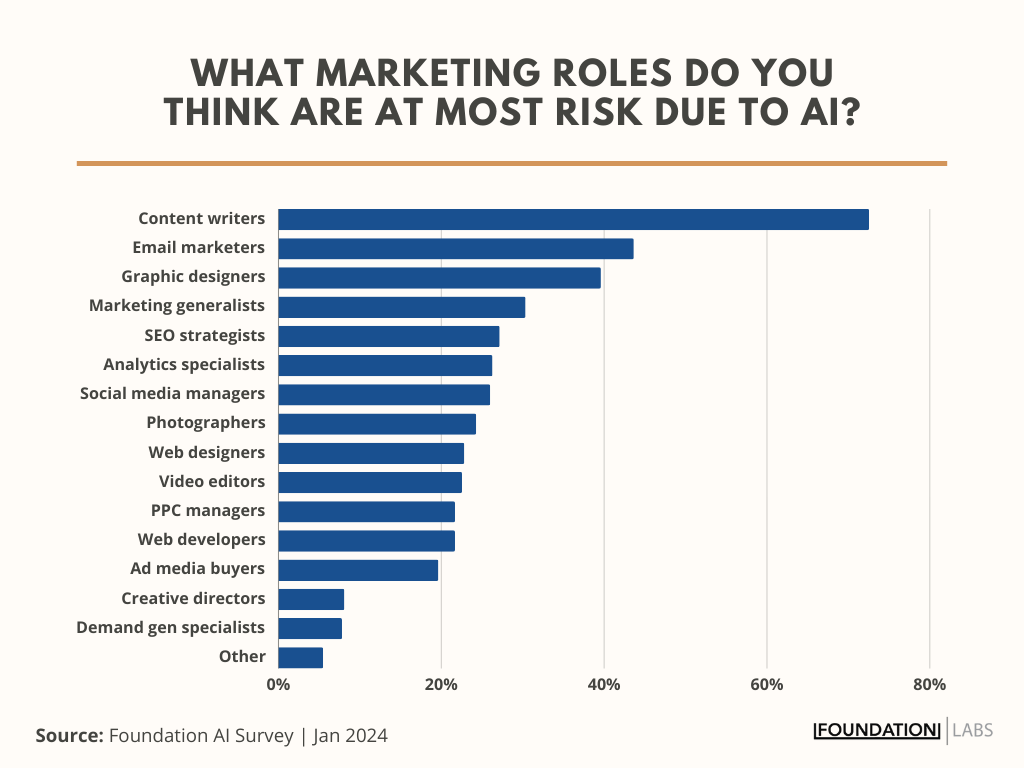
This makes sense, considering the widespread adoption of tools like ChatGPT, Jasper, and Writer, which can churn out decent content at an incredible rate. A McKinsey report of thousands of business leaders reveals that marketing and sales are the top domains for AI at the enterprise level, with content first drafts being the top use case.
The popularity of text-to-image generation tools is another major factor with an impact on our results. Nearly 40% of our respondents cited graphic designers as a marketing role that will be outsourced to artificial intelligence. Considering how easy it is to create visual assets with DALL-E and Midjourney prompts, this isn’t surprising.
The best SaaS marketing agencies are responding accordingly and investing in leveling up their AI work.
False Information Is the Biggest Risk Marketers Associate with AI
Since generative AI first hit the mainstream in the form of ChatGPT, everyone from teachers to researchers to business leaders has highlighted the same risk: the tendency to produce misinformation.
There’s been extensive coverage of the impacts this AI-generated misinformation can have on everything from elections to crisis management. Given all the attention, it’s not surprising that nearly half of our respondents cited false information as the top risk associated with AI.
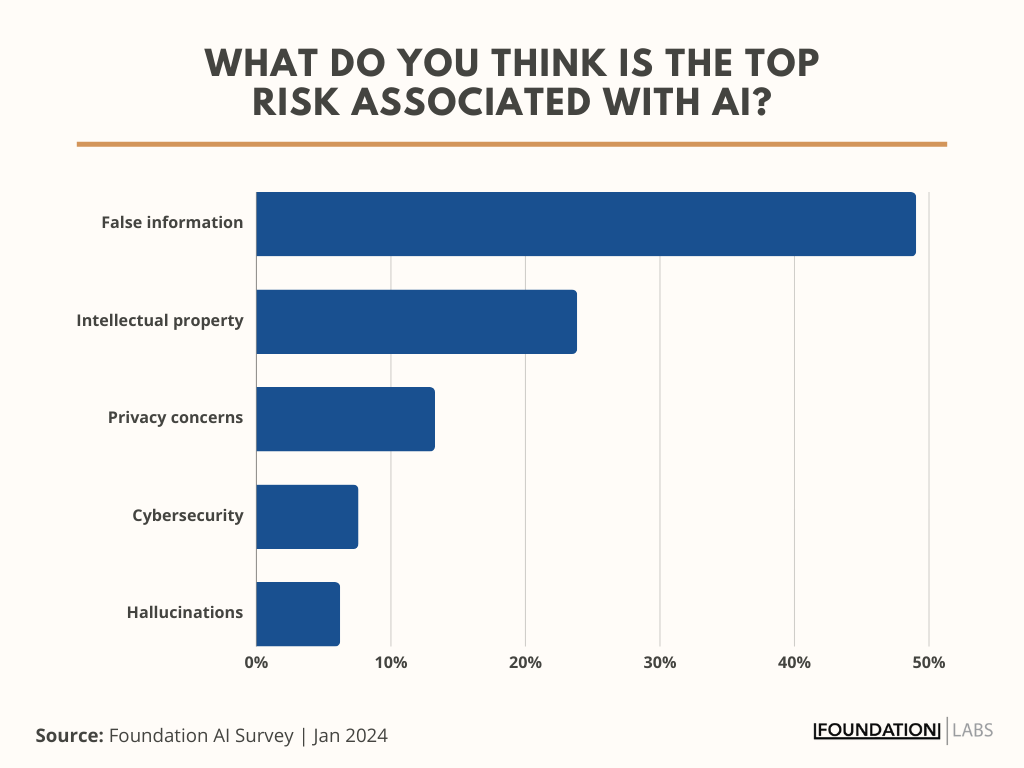
A significant number of marketers are also concerned with the impact artificial intelligence will have on intellectual property.
Because LLMs are, well, large, they thrive on new information. Companies can upload brand guidelines, strategies, and even user behavior data to generate everything from marketing content to GTM strategies. But this comes with a lot of risk.
Most companies choose to keep their most sensitive information out of large language models like ChatGPT to maintain security. OpenAI even has guidelines on how users can opt out of model training.
Marketers Are Much More Concerned with Deepfakes than Visual AI
We also asked our respondents how concerned they are with the growing use of visual and video AI creation tools. A slight majority of respondents, 57%, indicated no concern.
It seems there’s already a level of comfort or familiarity with the technology. Visual AI has been increasingly incorporated into various marketing activities, such as automated graphic design, photography enhancements, and content creation.

There is not the same level of ease surrounding deepfake technology.
We asked marketers how concerned they are with AI’s ability to create hyper-realistic video content—78% of them expressed a high level of concern with this technology.

In marketing and beyond, the use of generative AI for video raises serious ethical concerns, particularly regarding misinformation, identity theft, and the manipulation of media.
Of course, not everyone in the industry is so pessimistic about the outcomes of video AI 👀.
The Impact of Artificial Intelligence on the Industry and Beyond
Despite major concerns about job replacement and the negative impact of deepfakes, our respondents are resoundingly positive about the impact that artificial intelligence will have on the marketing industry.
More than 93% of our respondents feel that AI will have a positive impact on their work.

Venture capital and major companies continue to pour resources into the top AI model developers, resulting in products that perform well across an increasing range of tasks. Plus, companies continue to integrate them into tech stacks, giving marketers an increasing opportunity to test out these tools.
Time Savings Is the Biggest Benefit of Using AI
Our marketing respondents gave a resounding answer to the biggest benefit of using artificial intelligence in the workplace—time savings. Nearly 64% have experienced the benefits of using AI to create everything from emails to wedding vows (don’t recommend this one).
This overwhelming majority indicates a strong belief in AI’s efficiency and its ability to streamline processes. Marketers evidently value the time AI saves, which can be reallocated to strategic, creative, or more complex tasks that require human intervention.
The second most recognized benefit is the acquisition of new capabilities.
Almost 20% of our respondents highlighted AI’s role as a transformative tool that unlocks new possibilities in marketing, such as advanced data analysis, customer behavior prediction, and sophisticated content generation. AI capabilities are reshaping marketing strategies and operations, allowing for innovative approaches to customer engagement and market analysis.
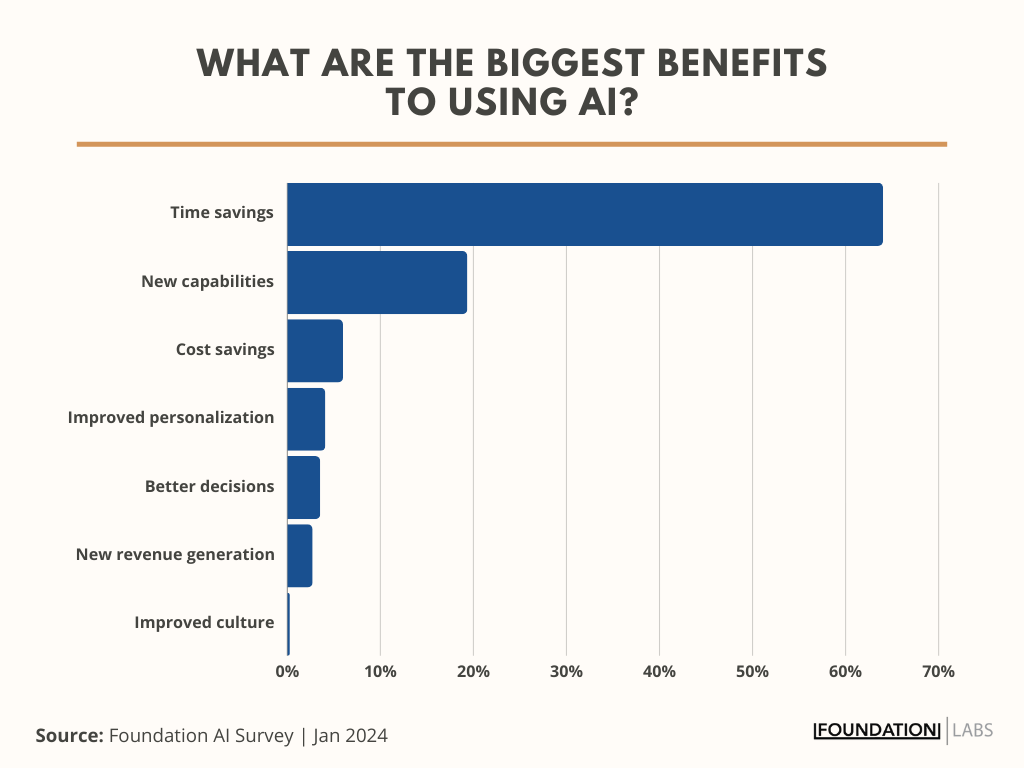
Notably, cost savings, which is often touted as a major advantage of AI, received a relatively low response rate of 6%. For many marketers, the apparent value of AI lies more in its operational enhancements than direct financial savings. That said, I have a sneaking suspicion that CMOs and high-level decision-makers are a lot more interested in this benefit.
Interestingly, only a minimal percentage saw AI contributing to better decisions (4%) and new revenue generation (3%). It seems the perceived value of AI in strategic decision-making and direct financial impact is still evolving. It could just be the early days of AI integration in high-level decision-making or revenue-focused strategies in marketing.
Most Marketers Believe AI Will Have a Positive Impact on Content
In terms of the impact AI is having on content, marketers are predominantly optimistic. Of our respondents, 62% believe that tools like ChatGPT and Jasper will boost the quality of content in the long term. Generating ideas, enhancing language, and automating routine tasks are some of the ways this technology will help marketers create better content in less time. AI is emerging as an augmentative force, boosting creativity and efficiency.

This is an interesting finding, considering most of our respondents also believe that AI-written copy is worse than that written by humans. In my opinion, this points to the rising trend of human-AI content teams that work together to produce better outputs than either would on its own. The content centaurs are coming.
Marketers Are Skeptical About AI for Sales, Strategy, HR, and More
Our survey also unearthed some skepticism about AI’s capacity to fully replace certain human-centric tasks within our lifetime.
The most doubted capability is AI’s ability to engage with sales prospects on calls, with 45% expressing disbelief in AI’s potential to replicate this complex human interaction. This skepticism likely stems from the nuanced nature of sales calls, which often require empathy, adaptability, and a deep understanding of human emotions and reactions—qualities that are inherently human and challenging to replicate in AI.
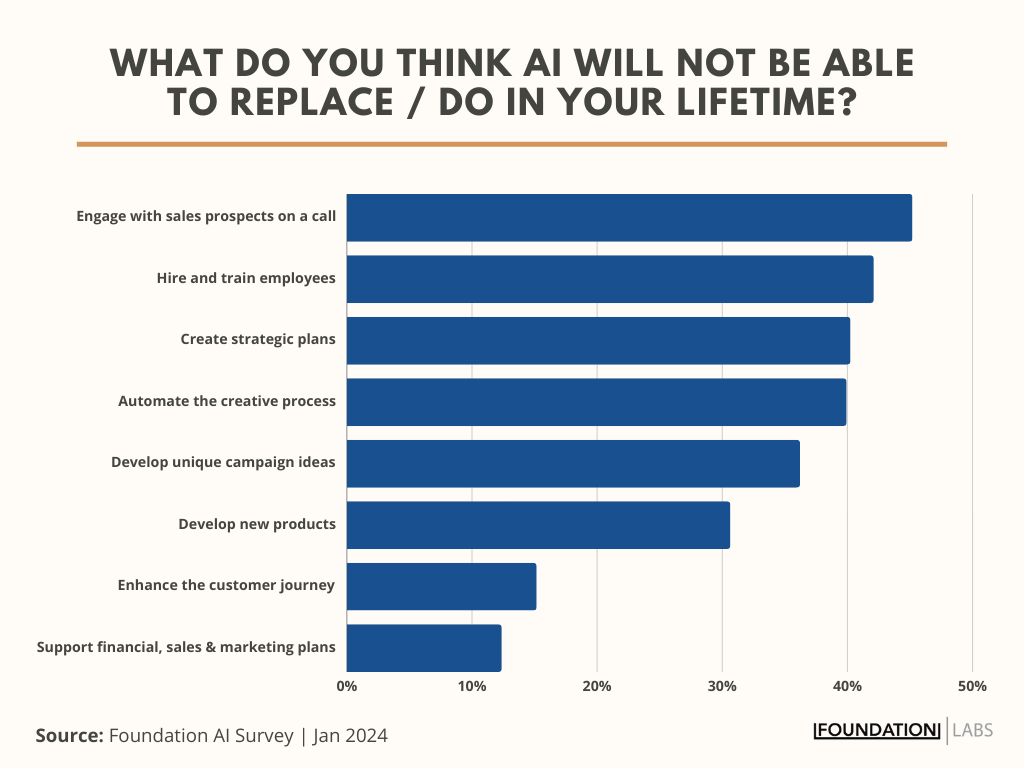
Creating strategic plans (40%) and hiring and training employees (42%) are also seen as tasks beyond AI’s reach. This is likely because high-level decision-making and understanding of organizational culture are still closely linked to human insight and intuition.
The data collectively reflects a cautious yet realistic view of AI’s limitations, recognizing its supportive role while affirming the indispensable value of human skills and attributes in certain professional domains.
How Leaders Are Looking to Implement AI in the Organization
Despite all the potential benefits and pitfalls of artificial intelligence, there’s no doubt that leaders in marketing and other departments want to use it. With each new day, it seems like another SaaS company is releasing a feature powered by ChatGPT or another generative AI.
So, we included a few questions in the survey to understand the relationship between leaders and artificial intelligence.
A combined 45% of respondents believe their leaders are very or extremely informed about AI. That’s a substantial segment of companies where leadership is highly knowledgeable about AI trends, applications, and implications.
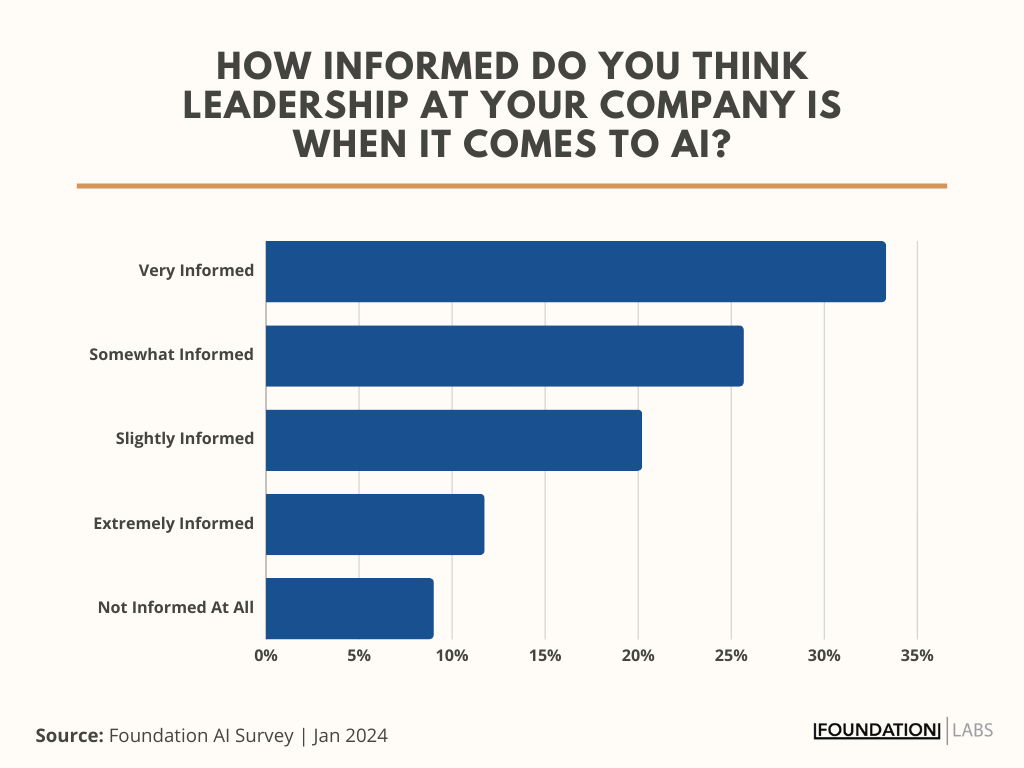
In contrast, 29% of respondents believe that leaders lack sufficient understanding of AI and are only slightly informed or not informed at all. This gap could impact these organizations’ ability to effectively implement and leverage AI technologies, potentially hindering their competitive edge and innovation capacity.
While many companies aren’t “very” knowledgeable about AI, that isn’t stopping leadership from wanting to see it implemented.
Most Marketing Leaders Want to See More AI Use in the Workplace
Nearly 60% of our marketing respondents state that leadership at their workplace is advocating for increased AI usage. It seems that companies are taking a proactive stance towards embracing AI technologies, reflecting an awareness of AI’s potential benefits, such as enhanced efficiency, data-driven decision-making, and a competitive advantage in the market.

Our survey also found that the overwhelming majority (88%) of leaders included AI in their planning for 2024.
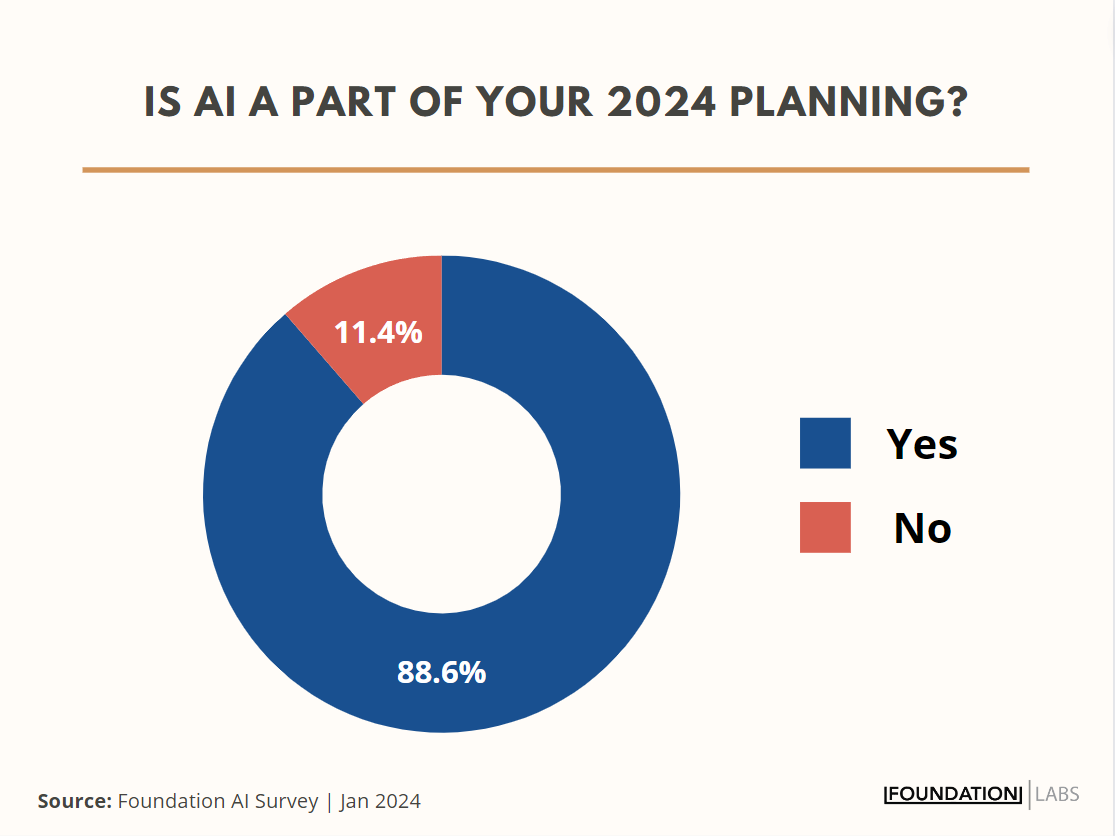
But exactly how much AI usage do leaders mean when they say they want to see an increase?
Most Companies Only Implement AI Across Limited Use Cases
Only about 22% of respondents report that there has been “widespread adoption” of AI into processes and tech stacks. However, the largest group, 47%, said that AI is currently only used in “limited use cases.” This implies that while AI is being utilized, its application is restricted to specific areas or projects. This selective approach could be due to various reasons, such as budget constraints, limited AI expertise, or a cautious attitude towards new technologies.
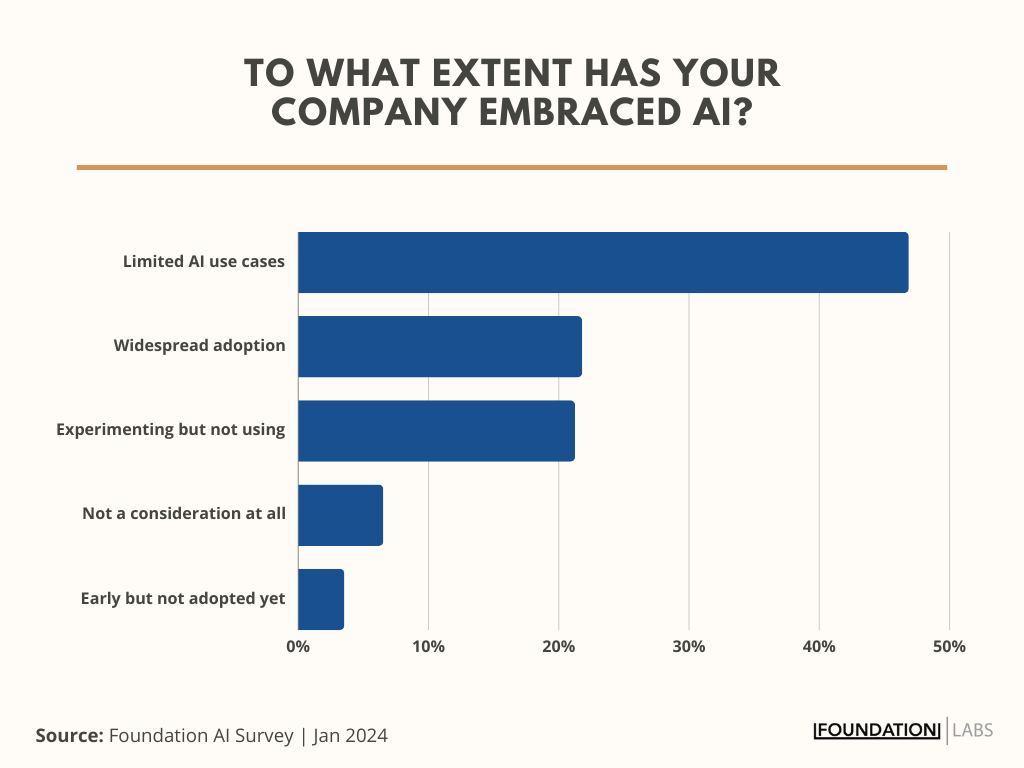
Meanwhile, “experimenting but not using’” AI is reported by 21%, reflecting a stage of exploration and evaluation of AI’s potential benefits and drawbacks before full-scale implementation.
Overall, the data indicates a broad spectrum of AI adoption in the business landscape, ranging from experimental phases to full integration, highlighting the diverse approaches companies are taking in leveraging AI technology.
Level Up Your Skill Set in 2024 with the AI Marketing Console
You have no doubt already noticed, but the numbers confirm that AI is going to be a massive part of marketing (and a lot of other spaces) in 2024 and beyond.
But adoption and implementation aren’t uniform. Some people are going to be using AI a lot more than others and, in the process, building up an incredibly valuable skill set. Whether it’s engineering prompts for better social and blog posts or using AI for more efficient data analysis, you need to experiment with these tools as much as possible.
Well, here’s your chance to get ahead (or catch up).
We recently launched our AI Marketing Console—a comprehensive course that includes over 130 battle-tested prompts you can use for landing page copy, video scripts, blog post creation, email writing, product descriptions, and more.







